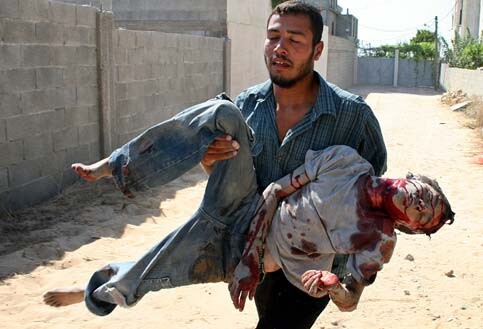Arab Media Watch 7 July 2006

A Palestinian carrying the body of a murdered boy after Israeli mobile artillery fired shells at Beit Lahiya in the northern Gaza Strip July 6, 2006. (MaanImages/Mohamed al-Zanon)
Arab Media Watch expresses its concern at the amount of coverage given to Israel’s killing yesterday of almost two dozen Palestinians, including civilians, compared with the kidnapping* of an Israeli soldier on 25 June, as well as the continued portrayal of the current crisis as being triggered by the kidnapping.
Comparing the initial report of each incident in the British national dailies, the Daily Mail, the Guardian and the Sun devoted more words to the kidnapped soldier than the Palestinian deaths, with the Times devoting around the same amount of coverage. The Daily Express and Daily Star report nothing today on yesterday’s deaths.
The Mail devoted 4 times as many words to the kidnapping (661, compared with 167), the Sun devoted just 79 words to the killings (105 for the kidnapping), and the Guardian devoted more than twice as many words to the kidnapping (826, compared with 393).
The Times devoted 514 words to the kidnapping and 553 words to the killings, though the headline today says nothing of the deaths (“Israeli tanks roll back into abandoned settlements”).
Furthermore, the media is continuing to portray the current crisis as being triggered by the kidnapping, which is not the case.
Besides the issue of thousands of Palestinian prisoners in Israeli jails (including women and children) that the Palestinian kidnappers have been trying to highlight, and the well-documented humanitarian crisis caused by Israel’s near-total control of the Gaza Strip (despite its withdrawal last September), Israel has been shelling the territory ever since, intensively so for weeks before the kidnapping.
This caused UN monitor John Dugard to state that “there has been a substantial deterioration in respect of human rights,” and UN Secretary General Kofi Annan to remind Israel “to respect international law.”
On 12 April, the UN Office for the Coordination of Humanitarian Affairs reported that Israel had “fired more than 2,300 artillery and tank shells into the Gaza Strip since 29 March, more than 150 shells a day.” It added that “the continuous firing of artillery shells and launching of…missiles are causing immense psycho-social strain on the Gaza population, especially on children. There are also additional risks from unexploded shells.
In April, five human rights organisations (three Israeli and two Palestinian) said that “the massive artillery fire causes disproportionate harm to the civilian population…subjects Israeli army officers and soldiers to war crimes charges,” and constitutes “a blatant violation of the Basic Rule of the laws of armed conflict whereby civilians and civilian objects must be distinguished from military objectives. The fact that Israel is confronting illegal firing of Qassam missiles at its own civilian population does not legitimize disproportionate responsive measures, which will knowingly lead to civilian casualties.”
From the start of June to the kidnapping of the soldier on 25 June, 49 Palestinians were killed and 170 injured, including women and children, according to the Palestine Red Crescent Society, causing great concern among human rights groups and threats of revenge from militant groups:
“We have decided to tell the occupier ‘no more truce from today’ in response to the bloodletting of our women, our children and our elderly. We will not suffer your repeated crimes in silence.”
Furthermore, the tank base from where the soldier was kidnapped is one of the locations from which Israel has been relentlessly shelling the Gaza Strip, and just one day earlier, Israeli commandos had raided Rafah and captured two brothers, Mustafa and Osama Muamar.
“All of this is well known but did not make it to the front page,” wrote Naftali Lavie, who served in an Israeli tank unit near Kibbutz Kerem Shalom, in Canada’s Globe and Mail newspaper. “Can it be that Palestinian lives are nothing, Israeli lives everything? That Palestinian captives are nothing, Israeli captives everything?”
Editor’s Note: The dictionary definition of the word “kidnap” necessitates that the abduction of a person is illegal. As the Israeli soldier was part of an occupying force, captured during a military raid against a military target, in international law he is considered to be a “prisoner of war”, not a kidnap victim. The rules governing the treatment of prisoners of war are spelled out in the third Geneva Convention of 1949, article 13 of which requires that POWs “must at all times be treated humanely”.
Arab Media Watch is an independent, non-profit organization set up in 2000 to monitor and analyse the British media’s coverage of Arab issues.
Related Links